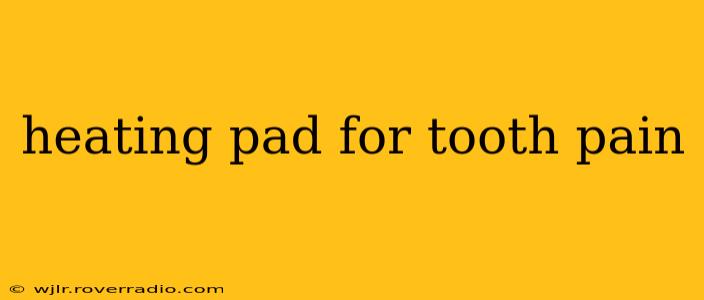Tooth pain is excruciating, and when it strikes, you'll try almost anything for relief. A heating pad might seem like a logical choice – after all, heat often soothes aches and pains. But is a heating pad actually effective for tooth pain, and are there any potential downsides? Let's explore.
Does a Heating Pad Help with Tooth Pain?
The short answer is: it depends. A heating pad can offer temporary relief from some types of tooth pain, but it's not a cure and might even worsen other types of dental issues. Heat can help relax the muscles in your jaw, which can alleviate pain caused by tension or temporomandibular joint (TMJ) disorders. However, if your tooth pain stems from an infection or abscess, applying heat could actually exacerbate the problem by increasing blood flow to the infected area.
What Types of Tooth Pain Might a Heating Pad Help?
A heating pad might provide some comfort for tooth pain related to:
- TMJ disorders: Temporomandibular joint disorders affect the jaw joint and surrounding muscles, causing pain and discomfort. Gentle heat can help relax these muscles, easing the pain.
- Muscle tension: Stress and clenching can lead to jaw muscle tension, resulting in tooth pain. Heat can help relax these muscles, providing temporary relief.
- Dry socket: After a tooth extraction, a dry socket (alveolar osteitis) can develop, causing intense pain. While not a primary treatment, some find that gentle heat can provide minimal comfort.
It's crucial to remember that this relief is temporary. A heating pad addresses the symptoms, not the underlying cause.
What Types of Tooth Pain Should NOT Be Treated with a Heating Pad?
Applying heat to certain dental problems could worsen the situation. Avoid using a heating pad if your tooth pain is accompanied by:
- Swelling: Increased blood flow from heat could increase swelling and spread infection.
- Pus: The presence of pus is a clear sign of infection, and heat should be avoided.
- Fever: A fever indicates a more serious infection, and a heating pad is not an appropriate treatment.
- Severe pain: If the pain is intense and unrelenting, seek immediate dental care.
How to Use a Heating Pad for Tooth Pain (If Appropriate)
If you decide to try a heating pad, follow these precautions:
- Low heat setting: Always use the lowest heat setting to avoid burns.
- Short duration: Apply heat for no more than 15-20 minutes at a time.
- Thin cloth barrier: Place a thin cloth between the heating pad and your skin to prevent burns.
- Never fall asleep with it on: This is a crucial safety precaution to prevent burns.
- Listen to your body: If the heat increases your pain or discomfort, stop immediately.
When Should You See a Dentist for Tooth Pain?
A heating pad is a temporary measure at best. It's crucial to see a dentist promptly if you experience:
- Severe or persistent tooth pain
- Swelling in your gums or face
- Pus or drainage from your gums
- Fever or chills
- Difficulty opening your mouth
Can a Heating Pad Cure Tooth Pain?
No, a heating pad cannot cure tooth pain. It might provide temporary relief for certain types of pain, but it does not address the underlying cause. Always consult a dentist for proper diagnosis and treatment of tooth pain.
What are other home remedies for tooth pain?
While a heating pad might help in some cases, other home remedies may provide more effective relief, such as rinsing your mouth with salt water, applying a cold compress, or using over-the-counter pain relievers like ibuprofen. However, these are temporary solutions and shouldn't replace professional dental care.
Is it safe to use a heating pad on my face near my tooth?
Using a heating pad near your tooth requires extreme caution. Maintain a safe distance and never apply direct heat to your face or gums. Always use a cloth barrier and monitor for any adverse reactions. Direct heat can cause burns and potentially worsen underlying conditions.
This information is for general knowledge and does not constitute medical advice. Always consult a qualified dental professional for diagnosis and treatment of any dental problems.
